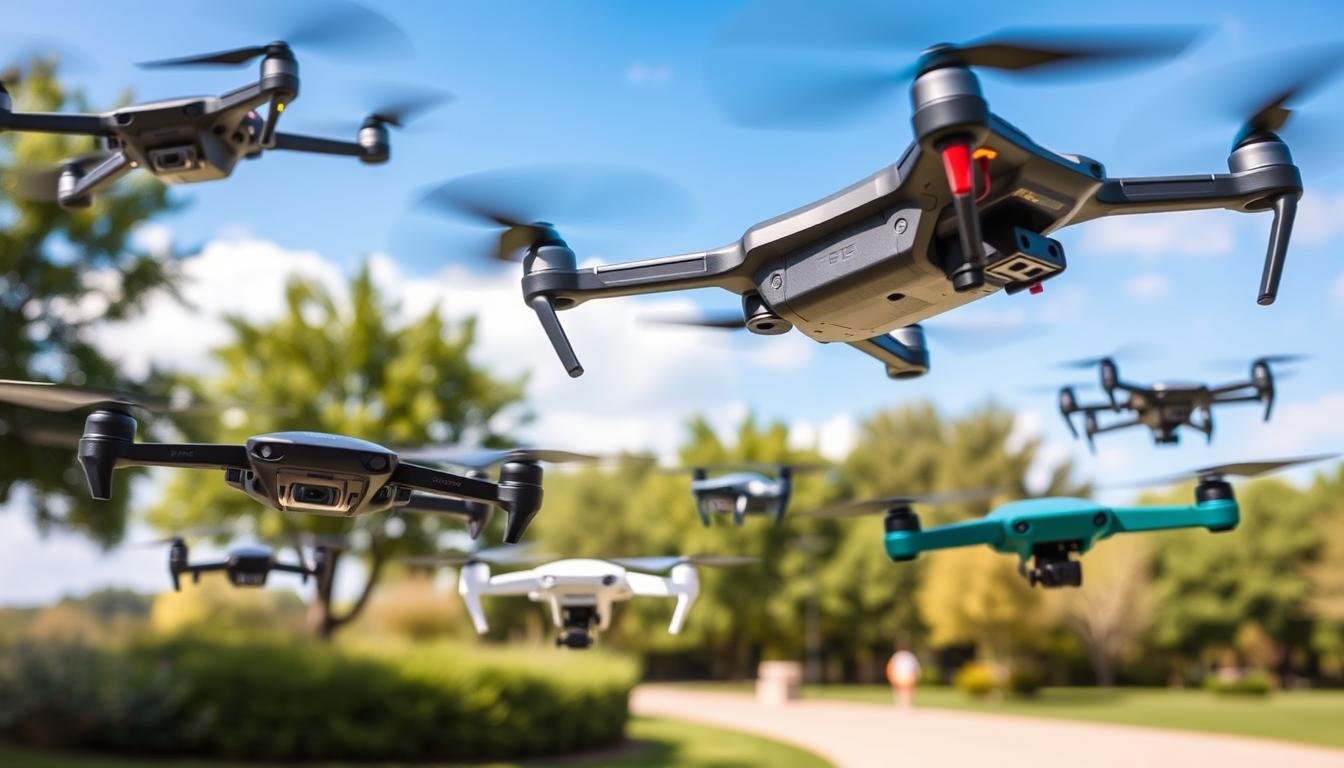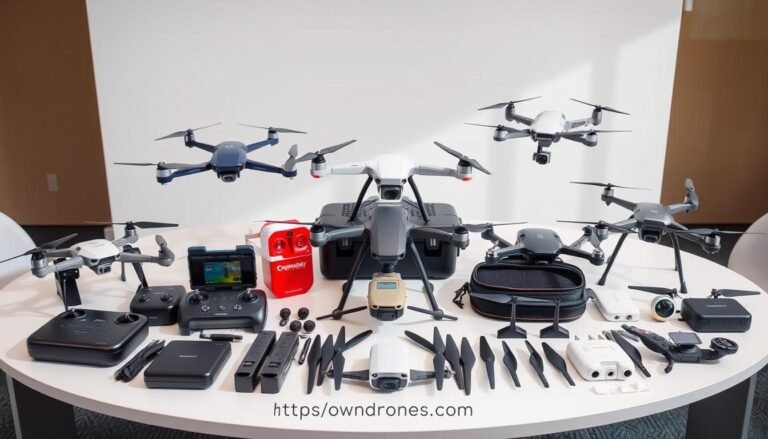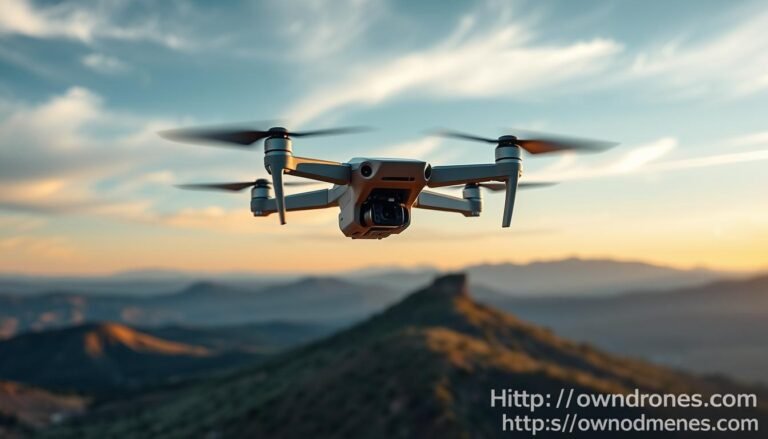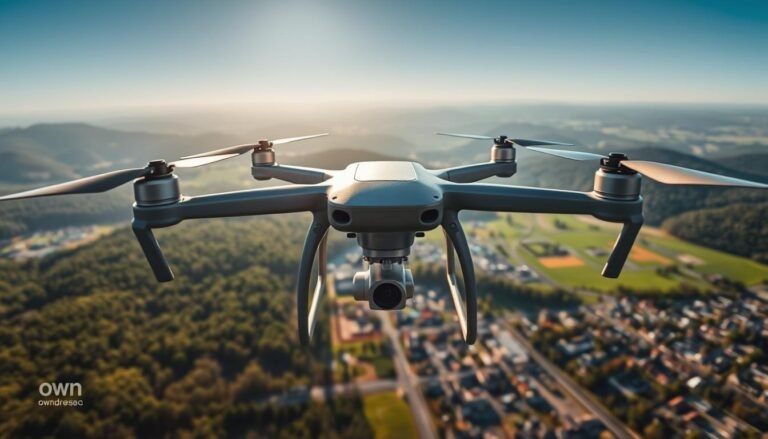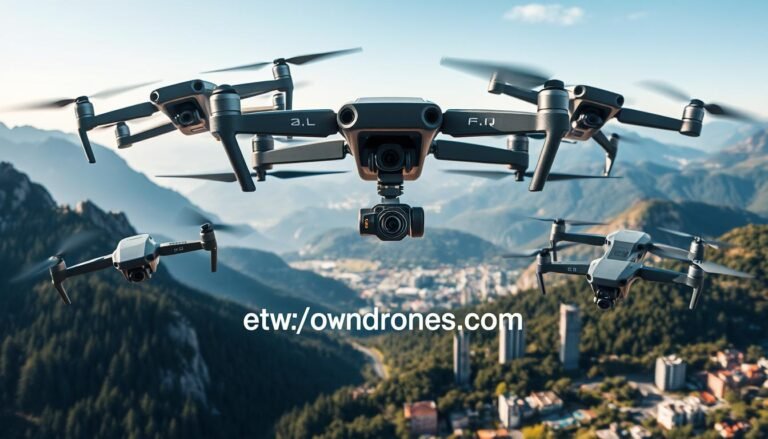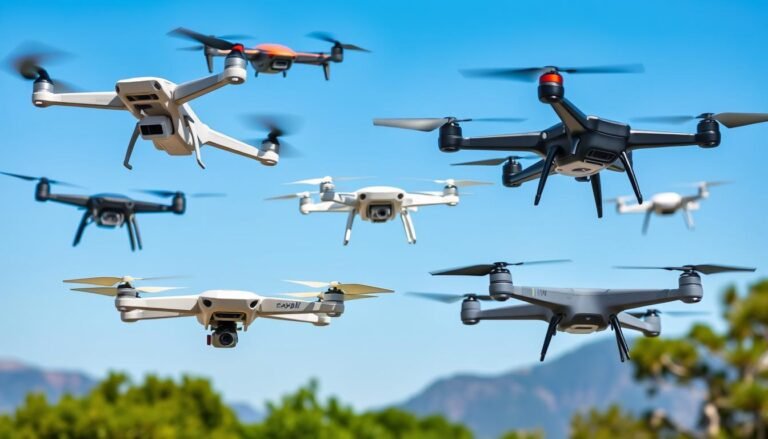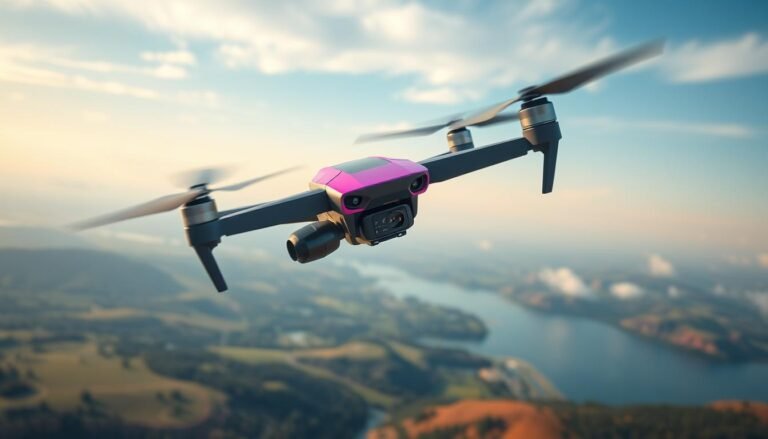Best Entry Level Drones for Beginners in 2025
Ready to explore the world of drones? Our guide reveals top beginner drones for 2025. We’ve selected affordable options under $200 with great features. These drones are easy to use and weigh less than 250g.
Our picks offer stable flight and impressive cameras. They’re perfect for new pilots and hobbyists alike. You’ll find drones suited for various interests and budgets.
We’ve chosen drones with user-friendly controls and steady hovering. These features help capture stunning visuals. Our list includes popular models like the DJI Mini 4K and Ryze Tello.
Start your aerial journey with the right beginner drone. You’ll soon be capturing amazing views from above. Get ready to unleash your creativity in the sky!
Key Takeaways:
- The best entry level drones for beginners in 2025 weigh under 250g, minimizing flight restrictions.
- The DJI Mini 4K is the overall favorite beginner drone, offering 4K video and intuitive controls.
- Budget-conscious beginners can opt for the lightweight and responsive Ryze Tello.
- The DJI Mini 4 Pro is the top premium choice for beginners, packed with advanced features.
- Beginner FPV enthusiasts will love the immersive experience of the BetaFPV Cetus X.
- Be aware of potential DJI drone bans in the US and adhere to registration and insurance requirements.
Introduction to Entry Level Drones
The world of drones is now more accessible than ever. Entry-level drones offer an easy way to learn flying basics. They’re perfect for beginners and aspiring aerial photographers.
These drones are designed for simplicity and ease of use. They often have intuitive controls and automated flight modes. Many come with built-in safety features to help new pilots.
Most beginner drones include cameras for photos and videos. As you improve, you can explore more advanced features and techniques.
When picking an entry-level drone, look at ease of use and stability. Consider camera quality and flight time too. Here are some popular options:
- DJI Mini 4 Pro: Priced at $959.00 on Amazon with a 4.5 outstanding rating, this drone offers a 48 MP camera, 4K60 video, and an impressive 34-minute battery life (47 minutes with the extended battery).
- DJI Mini 3: Available for $329.00 on Amazon with a 4.0 excellent rating, it features a 12 MP camera, 4K30 video, and 38-minute flights (51 minutes with the extended battery).
- Autel Robotics Evo Nano+: Priced at $899.00 on Amazon with a 3.5 good rating, this drone boasts a 50 MP camera, 4K30 video, and approximately 28 minutes of flight time per charge.
- DJI Neo: At $199.00 on Amazon with a 3.5 good rating, it offers a 4K video camera, 22GB internal storage for 40 minutes of 4K footage, and up to 18 minutes of flight time per charge.
You can find many drone training resources and drone tutorials online. These cover basic controls, safety rules, and flying techniques. Local drone groups and workshops offer hands-on experience too.
The joy of flying a drone is not just in the destination, but in the journey of learning and mastering the skills.
As you start flying, always put safety first. Follow local rules and fly responsibly. With practice, you’ll soon be capturing amazing aerial views.
Key Features to Look for in Beginner Drones
Choosing the right drone for beginners is crucial. Here are some key features to consider when picking your first drone:
Ease of Use and Intuitive Controls
Beginners need drones that are simple to operate. Look for models with easy-to-use controls and smartphone integration. Many starter drones offer one-key takeoff and landing features.
Stability and Hovering Capabilities
Stability is vital when learning to fly a drone. Choose models with built-in sensors and advanced flight algorithms. These features help maintain a stable hover, even in windy conditions.
Camera Quality and Resolution
For aerial photography, consider the drone’s camera quality and resolution. Entry-level drones may have basic cameras, but many offer decent quality for beginners. Look for drones with at least 1080p video and 12MP photo resolution.
The DJI Mini 3, for example, offers 4K video at 30 fps and a 12MP camera.
| Drone Model | Camera Resolution |
|---|---|
| DJI Mini 4 Pro | 4K at 60 fps |
| DJI Mavic 3 Classic | 5.1K at 50 fps |
| DJI Air 3S | 48MP |
Flight Time and Battery Life
Check the drone’s flight time and battery life. This determines how long you can fly in one session. Most beginner drones offer flight times between 10 to 30 minutes.
Some high-end models like the DJI Mini 3 boast an impressive 51 minutes with an extended battery.
The DJI Mini 3 drone boasts an impressive flight time of up to 51 minutes with an extended battery.
Keep these features in mind when choosing your first drone. This will help you select a beginner-friendly model that fits your needs.
Best Entry Level Drones
The drone market offers many options for beginners in 2025. These starter drones are user-friendly and perfect for learning. Let’s explore some top choices for new pilots.
DJI Mini 4K
The DJI Mini 4K is a favorite among new drone pilots. It’s compact, weighing just 8.8 oz, yet captures stunning 4K60 video.
With up to 34 minutes of flight time, you’ll have ample practice opportunities. The DJI Mini 4K costs $959.00 on Amazon.
Ryze Tello
The Ryze Tello is an excellent budget-friendly option for beginners. It’s tiny and perfect for mastering basic flight skills.
Features like Altitude Hold and GPS Stabilization make it easier to control. The Ryze Tello offers an affordable entry into drone flying.
Potensic Atom
The Potensic Atom is a cost-effective alternative to pricier models. It boasts a 3-axis gimbal and 4K camera for impressive aerial footage.
Priced under $500, the Potensic Atom offers great value for beginners. It’s ideal for those wanting to explore advanced drone capabilities.
When selecting a beginner drone, consider these key factors:
| Drone | Price | Weight | Video Resolution | Battery Life |
|---|---|---|---|---|
| DJI Mini 4 Pro | $959.00 | 8.8 oz | 4K60 | 34-47 min |
| DJI Mini 3 | $329.00 | 8.8 oz | 4K30 | 38-51 min |
| Autel Robotics Evo Nano+ | $899.00 | 8.8 oz | 4K30 | 28 min |
| DJI Neo | $199.00 | 4.8 oz | 4K | 18 min |
Beginners should focus on drones that are easy to use and stable. Look for safety features like propeller guards.
Choosing the right entry-level drone will set you on the path to becoming a skilled pilot. Happy flying!
Budget-Friendly Starter Drones
Finding an affordable drone requires focus on key features for beginners. The Ryze Tello and Potensic Atom offer great ways to learn drone flying basics. These budget-friendly options won’t empty your wallet.
Black Friday sales bring amazing deals on entry-level drones. The Redrie Drone is now $45, down 74% from $200. The Holy Stone HS175D GPS Drone costs $136, a 20% discount from $170.
These affordable drones let kids and beginners explore aerial photography. They provide a fantastic opportunity to capture stunning images and videos from above.
- Camera quality: Look for drones with at least a 12-megapixel photo shooting capability to ensure clear and high-resolution images.
- Flight time: Opt for drones with longer battery life, such as the DJI Air 3, which offers up to 46 minutes of flight time.
- Stability and obstacle avoidance: Choose drones equipped with crash-avoidance sensors and stable flight performance, even in windy conditions.
Here’s a comparison of some popular budget-friendly drones:
| Drone Model | Original Price | Black Friday Price | Discount |
|---|---|---|---|
| DJI Mini 3 Fly More Combo | $719 | $559 | 22% |
| Redrie Drone | $200 | $45 | 74% |
| Holy Stone HS175D GPS Drone | $170 | $136 | 20% |
| Potensic Atom SE | $300 | $230 | 23% |
Budget-friendly starter drones open doors to exciting aerial adventures. You can begin without spending a fortune. As your skills grow, you can upgrade to more advanced models with better features.
Drones with Advanced Features for Beginners
Beginner drone pilots often seek the best training drones. Some entry-level models offer advanced features that enhance learning. These features provide a smooth transition to more sophisticated drones.
The Autel Robotics Evo Nano+ is an excellent choice for beginners. It offers advanced imaging in a compact form. Priced at $899.00 on Amazon, it balances professional features with safety and ease of use.
Collision Avoidance Systems
Collision avoidance systems help prevent crashes and minimize drone damage. The DJI Mini 4 Pro and Skydio 2 have advanced obstacle avoidance sensors. These sensors detect and avoid obstacles in the drone’s flight path.
Automated Flight Modes
Automated flight modes simplify drone flying for beginners. These modes allow drones to perform specific tasks automatically. The DJI Mini 3, priced at $329.00 on Amazon, offers intuitive automated flight modes.
FPV (First-Person View) Capabilities
FPV drones provide an immersive flying experience. They let you see through the drone’s camera as if you’re in the cockpit. The DJI Avata offers FPV capabilities with intuitive controls and built-in safety features.
When choosing a training drone, look for ease of use, affordability, and advanced features. The DJI Mini 2 SE is a top choice for beginners. It combines user-friendliness, budget-friendly pricing, and good camera quality.
Drones for Aerial Photography and Videography
Camera drones are great for aerial photography beginners. Entry-level drones like DJI Mini 4K and Autel Evo Nano+ offer high-quality cameras. These drones capture stunning aerial photos and videos.
When picking a drone, look at camera resolution and gimbal stabilization. Consider manual camera controls too. Basic aerial photography drones cost $500 to $1,000.
Mid-range film drones with better features range from $1,000 to $3,000. These drones offer more advanced capabilities for photographers.
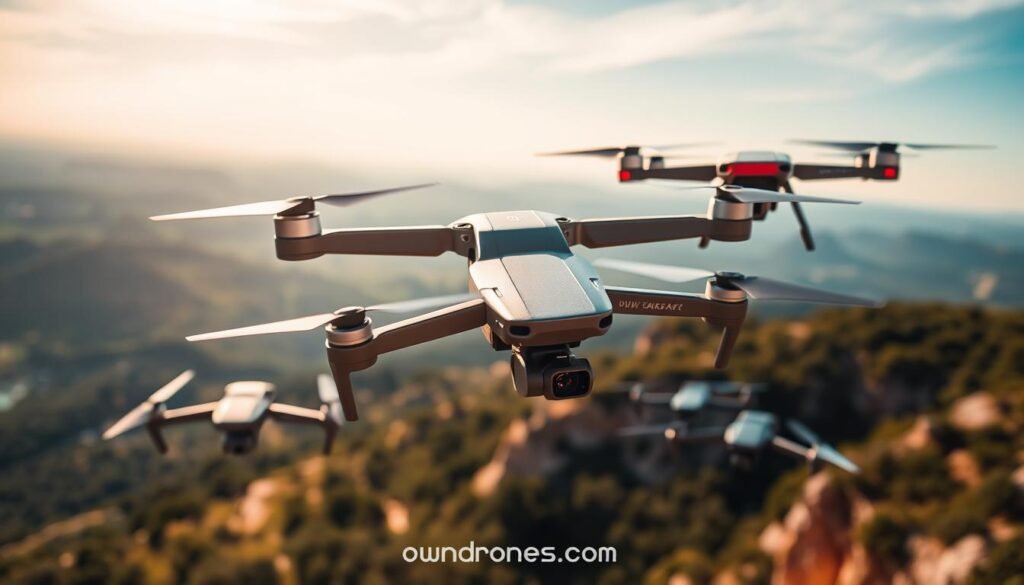
DJI camera drones are top choices for aerial photography. The Mavic series, especially Mavic 2 Pro and Air 2S, are popular. DJI Mavic 3 Classic costs £1,219 / $1,279.
The Mavic 3 Classic is best for enthusiast photographers. DJI Mavic 3, priced at £900 / $1,000, suits advanced photographers best.
Autel Robotics Evo, Freefly Alta 8 Pro, and Skydio 2 are also great options. DJI Neo, at $289 / £299, is the best cheap drone.
DJI Mini 4 Pro, priced at $759 / £689, is the top sub-250g drone. It’s ideal for aerial imaging.
RGB cameras are common for general aerial photography. Thermal cameras help in agriculture and search operations. Multispectral cameras excel in precision agriculture.
Hyperspectral cameras monitor environments and explore minerals. LiDAR systems map terrain and monitor construction sites. They create detailed elevation models.
Choose your drone based on your specific photography needs. Consider the various camera options available for best results.
Compact and Portable Drones for Travel
Capturing stunning aerial footage during your travels requires a compact, portable drone. Beginners need drones that are easy to pack and carry. Several excellent options offer the perfect balance of portability and performance.
Travel-friendly drones often feature foldable designs. The DJI Air 3 and DJI Mavic 3 Pro can fold into incredibly compact sizes. They easily fit into a backpack or carry-on luggage.
The DJI Air 3 measures just 8 by 3.5 by 3.25 inches when folded. It weighs only 1.5 pounds, making it highly portable.
These drones also boast lightweight construction. The DJI Mini series, including the Mini 4 Pro, are designed to be light. The DJI Mini 3 weighs just 248 grams, making it ultra-portable.
Foldable Designs
Foldable drones are perfect for travelers and beginners. They can shrink to a fraction of their size for easy storage. The DJI Air 3S folds down compactly without sacrificing its impressive camera capabilities.
Lightweight Construction
Lightweight construction is crucial when choosing a travel drone. The DJI Neo caters to social media content creators who need a lightweight drone. These drones typically weigh between 248 grams and 1.5 pounds.
For beginners, portability and ease of use are key factors. Foldable, lightweight drones let you capture stunning aerial footage anywhere. You’ll never miss an opportunity to document your adventures from above.
Drones with Smartphone Integration
Many beginner-friendly drones can be controlled using a smartphone app. This makes flying and capturing footage easier without a separate controller. It’s a convenient option for new pilots looking for good controls.
When picking a drone with smartphone integration, keep these factors in mind:
- Ease of use and intuitive app interface
- Compatibility with your smartphone’s operating system (iOS or Android)
- Range of flight controls available through the app
- Live video feed quality and latency
| Drone Model | Key Features | Price Range |
|---|---|---|
| DJI Mini 4 Pro | 360 obstacle avoidance, improved image quality, compact design | $799 – $999 |
| DJI Mini 4K | Lightweight, affordable, praised for ease of use | $399 – $599 |
| Ryze Tello | Simple, lightweight, affordable, ideal for first-time flyers | $99 – $199 |
Some drones offer both smartphone and dedicated controller options. The DJI Mavic Mini is one example. This flexibility allows for more precise control as you improve your skills.
The best drone is the one that fits your needs and skill level. Don’t be afraid to start with a simple, smartphone-controlled drone and work your way up as you gain experience.
Choosing a drone with smartphone integration and good controls is a great start. You’ll be ready to capture stunning aerial footage and explore drone photography. The exciting world of drones awaits you!
Safety Considerations for Beginner Drone Pilots
Safety is key for new drone pilots. Learn the rules and best practices before flying. This ensures a fun and safe experience for everyone.
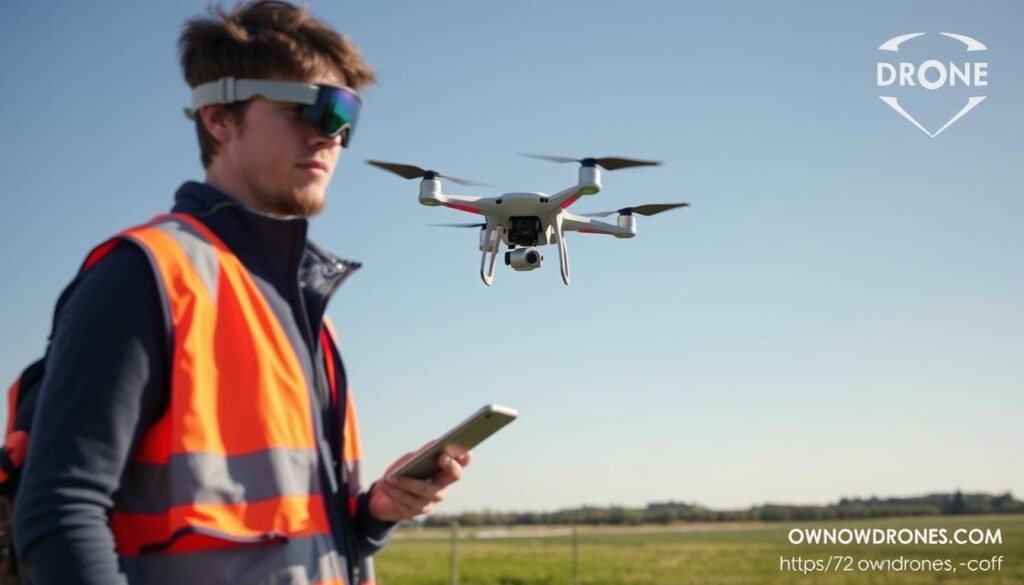
U.S. drone pilots must follow FAA rules. Drones over 250 grams need FAA registration. Commercial pilots require a Part 107 Remote Pilot Certificate.
Understanding Regulations and No-Fly Zones
Check local drone laws before your first flight. U.S. recreational pilots must follow specific rules. These include drone registration and passing a safety test.
Pilots must keep drones in sight and follow CBO guidelines. Know about no-fly zones like airports and stadiums. Many drones have geofencing, but you’re responsible for following rules.
Importance of Registration and Insurance
Registering your drone shows responsible ownership. It helps authorities contact you if your drone is lost or in an incident.
Consider getting drone insurance for protection. It can cover damage and liability claims. This gives peace of mind during flights.
Always set up your drone properly before flying. Check the battery and signal connection. Update the home point if needed. Rushing pre-flight checks can cause costly mistakes and safety risks.
Follow regulations, register your drone, and prioritize safety. This approach helps you enjoy drone flying responsibly.
Accessories and Add-Ons for Entry Level Drones
Investing in accessories can enhance your drone flying experience. These extras protect your drone and improve your enjoyment. They also help ensure safe and fun flights.
Extra Batteries and Chargers
Extra batteries and chargers are crucial for entry-level drones. Flight times vary from 8 to 31 minutes, depending on the model. Having spare batteries extends your flying sessions without interruptions.
Choose batteries compatible with your specific drone model. A multi-battery charger can save you time and effort.
Propeller Guards and Spare Parts
Propeller guards are essential for beginner pilots. They protect your drone’s propellers from damage during collisions or rough landings. Some drones include propeller guards, while others require separate purchases.
Keep spare propellers and small parts on hand. These replacements help with wear and tear or accidental damage.
For stability, consider these top entry-level drones:
- DJI Mini 4K: Weighs 249g with an advanced flight control system for excellent stability.
- Ryze Tello: At 80g, it’s incredibly stable and easy to fly, perfect for beginners.
- Potensic Atom SE: Weighs 249g with GPS and hovering capabilities for stable flights.
Accessories ensure your drone is always ready to fly. They protect against damage and maximize your enjoyment. These add-ons contribute to stable, safe flying experiences.
Learning Resources for Beginner Drone Pilots
New drone pilots have many online resources to boost their skills. You’ll find tutorials, courses, communities, and forums to help you master your drone. These tools support your journey as a novice pilot.
Drone Pilot Ground School is a top resource for aspiring pilots. It boasts a 99% pass rate for the FAA Part 107 test. The course costs $299, but Drone Last readers get a $100 discount with code DRONELAST.
This course offers unlimited lifetime access and takes 15-20 hours to complete. If you fail your first attempt, you’ll get a full refund plus the $175 exam fee.
Online Tutorials and Courses
LinkedIn Learning offers a free drone course called Cert Prep FAA 107 Commercial Drone License. The Drone Pilot Skill Builder course teaches practical exercises and emergency procedures. Its fee ranges from $150 to $670.
DARTdrones’ FAA Part 107 Test Prep Course has helped over 9,000 students pass. It boasts a 99% success rate. The mid-tier package costs $375 and includes 8 hours with an expert pilot.
Drone Flying Communities and Forums
Joining drone communities helps you connect with fellow pilots and learn from others. These platforms offer support, advice, and updates on industry trends. You can ask questions and share experiences.
Popular drone flying communities include:
- DJI Forum
- DroneU
- UAV Coach Community
- Drone Pilots Media
Engaging with these communities provides valuable insights from experienced pilots. You’ll improve your skills and avoid common mistakes. Join today to enhance your drone piloting journey.
Conclusion
Starting your drone journey can be thrilling and daunting. In 2025, there are many great options for beginners. You can find drones for stunning aerial shots or just for fun flying.
When choosing your first drone, look at ease of use and stability. Camera quality and flight time are also important. Features like intuitive controls and collision avoidance make flying easier.
Entry-level drones usually fly for 15-20 minutes per battery. Some models, like the Valor F1 and F35, offer longer flight times. Consider drones with extra batteries to extend your flying sessions.
Safety should be your top priority when flying drones. Learn about local rules and no-fly zones. Register your drone and get insurance if needed.
With the right beginner drone, you’ll soon be capturing amazing aerial footage. Check out https://mavely.app.link/e/2RKE62lxXOb for great drone deals. Visit https://owndrones.com for the latest drone news and updates.
